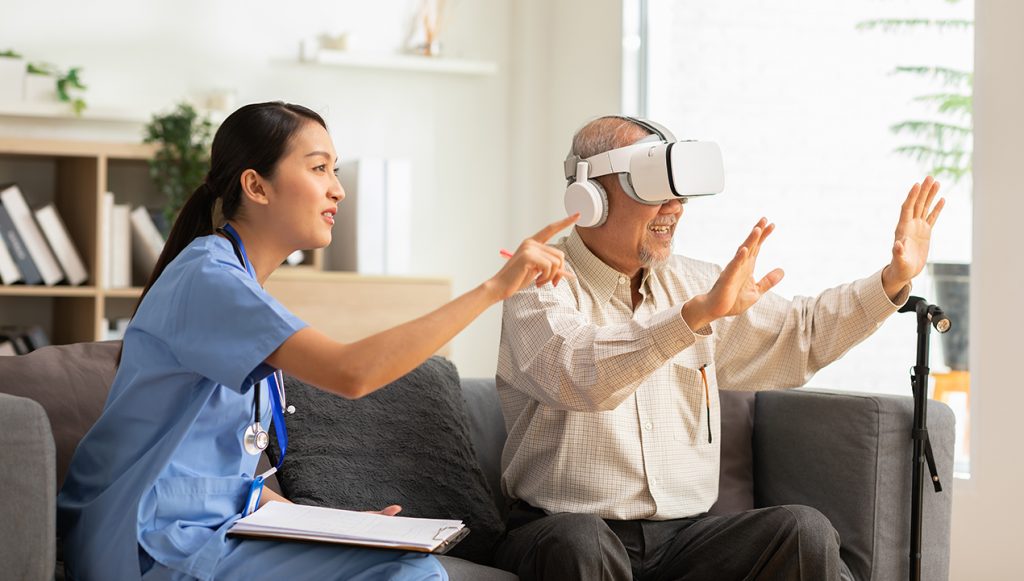Reflecting on World Cancer Day, our exploration within the swiftly evolving oncology landscape spotlights Virtual Reality (VR) as a transformative force in patient education. In the specific domain of cancer awareness, virtual reality for patients has transcended the status of a mere tool, emerging as a powerful medium reshaping the fundamental dynamics of physician-patient communication. This advanced technology introduces a paradigm shift in educational approaches, providing oncologists with an immersive and enriched platform to convey the intricacies of cancer with precision.
As oncologists increasingly integrate VR for cancer awareness into their practices, the prospect of revolutionizing patient education becomes more tangible. This blog delves into the profound impact of virtual reality in patient education, unveiling how it fundamentally redefines the narrative of cancer awareness, fostering a heightened connection between medical professionals and their patients.
VIRTUAL REALITY IN PATIENT EDUCATION: HOW IT HELPS ONCOLOGISTS SPREAD CANCER AWARENESS

Virtual Reality, as an educational tool, provides an unparalleled experience that extends far beyond the confines of traditional patient education methods. For oncologists, it opens up a transformative avenue to guide their patients on an immersive journey deep into the intricate details of cancer biology.
Here are some ways in which virtual reality for patients can help oncologists use it as a tool to spread cancer awareness:
- Sheds Light on Cancer’s Complexities
Through meticulously crafted virtual scenarios, oncologists can now showcase the complex processes occurring at the cellular level, vividly portray tumor formations and illustrate the nuanced progression of diseases. This visually engaging and comprehensive approach serves as a powerful medium for oncologists to bridge the communication gap effectively.
By offering patients a firsthand, virtual exploration of their condition, oncologists empower them with a heightened understanding of the intricacies involved, fostering a more informed and engaged partnership in the journey towards managing and treating cancer.
- Improves Personalized Treatment Discussions
In case of cancer treatment, a universal approach is inadequate. Oncologists frequently encounter the challenge of elucidating intricate treatment options and potential side effects to patients.
The integration of virtual reality in patient education facilitates the development of personalized, patient-specific scenarios. Through these tailored experiences, the expected outcomes of diverse treatment approaches can be effectively demonstrated. This not only enhances the capacity for informed decision-making but also instills a sense of empowerment in patients, encouraging their active participation in shaping and understanding their treatment plans.
- Breaks Language Barriers
In a diverse healthcare landscape, where patients and physicians may come from different cultural and linguistic backgrounds, effective communication can sometimes be a challenge. VR for cancer patients transcends language barriers by relying on visual and interactive elements.
Oncologists can utilize virtual reality for patients to convey critical information about cancer, irrespective of language differences, ensuring that every patient receives comprehensive and easily digestible education.
- Helps Present Case Studies (Patient Success Stories)
Oncologists can seamlessly incorporate virtual reality for healthcare into patient education, supported by enlightening case studies (in a video format) of patient success stories. The primary goals are to reduce patient anxiety and indirectly enhance adherence to treatment plans. VR for cancer awareness not only deepens medical understanding but also alleviates patient concerns, creating a more engaged and reassuring healthcare experience.
Physicians reading this blog, seize the opportunity to be a driving force in MDForLives’ World Cancer Day initiative! Through this initiative, we acknowledge the crucial role of ‘awareness’ in transforming cancer patient care.
Showcase your impactful success stories fueled by patient awareness and join us in making a difference. Your participation is the key to transforming lives!
Submit your impactful case studies by February 10, 2024. In appreciation of your contribution, MDForLives is pleased to offer a remuneration of $100 for each shared experience.
Click to submit case studies of your success stories now and earn $100!
OVERCOMING CHALLENGES AND EMBRACING THE FUTURE

The integration of virtual reality in patient education holds considerable promise, but its successful incorporation into medical practices requires physicians to acknowledge and overcome potential challenges. Paramount among these challenges are technological barriers, patient acceptance considerations and the imperative for continuous training. An adept approach to these challenges, coupled with an unwavering commitment to staying informed about the latest advancements in VR technology, positions physicians to harness the full potential of virtual reality in patient education.
- Technological barriers pose a significant challenge as virtual reality for healthcare technology rapidly advances. Oncologists may encounter obstacles related to compatibility, infrastructure and the availability of suitable hardware and software. Addressing these challenges necessitates a proactive strategy involving collaboration with technology experts and maintaining a keen awareness of the evolving landscape of VR equipment and platforms.
- Patient acceptance, a critical factor in the successful adoption of VR for cancer patients, requires oncologists to carefully gauge and understand patient preferences. Mitigating potential concerns and tailoring the use of VR to individual patient needs are essential to fostering a sense of comfort and engagement with this innovative educational approach.
- The implementation of virtual reality for patients also mandates continuous training for medical professionals. Staying abreast of the latest developments, applications and best practices in VR technology is imperative. Oncologists must invest time in ongoing education and training programs to confidently and effectively incorporate virtual reality in patient education strategies.
By proactively addressing these challenges, oncologists can be leaders in integrating VR for cancer awareness education. This approach not only aids in overcoming current obstacles but also establishes a foundation for a future where VR plays a central and transformative role in enhancing the understanding and management of cancer within the medical community.
CONCLUSION

Virtual reality in patient education stands out as a game-changer, offering physicians an extraordinary means to communicate intricate medical details with unparalleled clarity. This cutting-edge technology goes beyond the ordinary, emerging as a vital tool for physicians as they navigate the intricate terrain of medical education in oncology, pushing the boundaries of traditional approaches.
MDForLives is dedicated to raising the bar in healthcare and as a healthcare professional, your pivotal role can turn this commitment into reality. Join us and receive a $10 joining bonus upon registration, redeemable after completing a survey. Register now!
References:
- Use of virtual reality in oncology: From the state of the art to an integrative model
www.frontiersin.org - Virtual Reality in Healthcare: Transforming Treatment
www.researchgate.net - Role of Virtual Reality in Supporting Cancer Patients
www.cognihab.com

The creative force behind the keyboard, Pallabi crafts narratives of healthcare wonders and research marvels. As a seasoned professional blogger, she ventures to unearth the riches of medical innovation, weaving them into insightful stories that educate.






